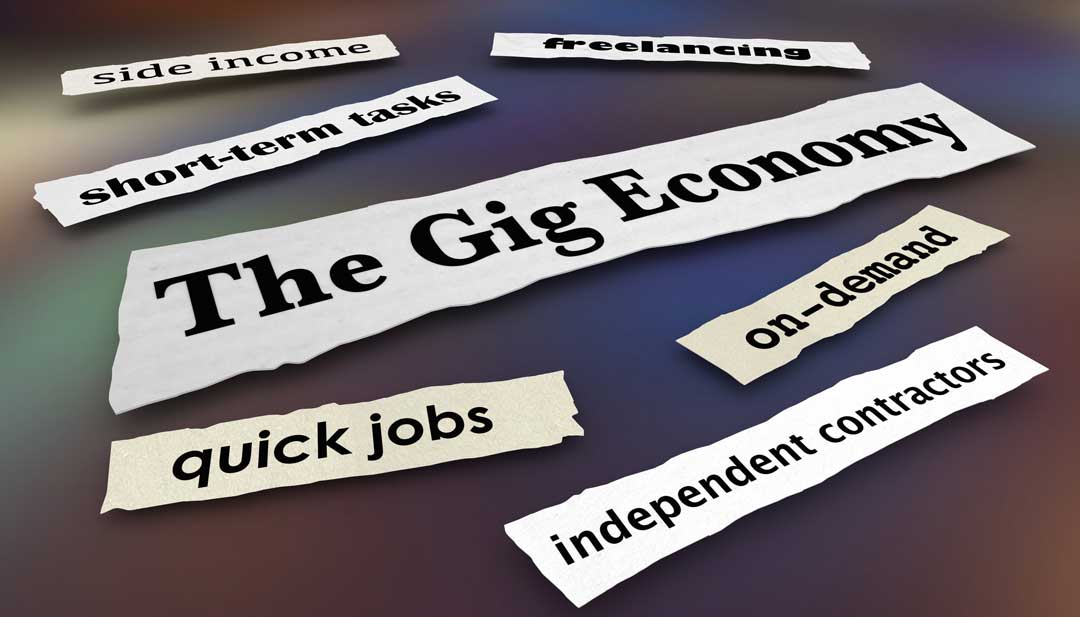
About hobbies and side hustles
You may think it is just a hobby, but CRA may disagree. CRA wants its fair share if you earn money through a little side hustle, business activity, or another extra gig. The agency believes many tax dollars in the past may have gone uncollected about hobbies and side hustles, and they aren’t happy about it.
How and where you make money is shifting, and CRA has been paying close attention to what is referred to as “platform economies.”
A platform economy brings buyers and sellers together through the internet or mobile apps. These sources are gaining traction and popularity and could be significant contributors to household income that has gone unreported.
Let’s break down the platform economies.
The Gig Economy
This one isn’t new, and many will tell you that the gig economy can make ends meet.
You provide service on a short-term basis, pick up a contract for a period of time, or go the freelance route. Companies hire independent contractors or freelancers in a gig economy, often through online platforms or apps. These workers are typically considered to be self-employed instead of employees. The money from the gig economy is considered to be income.
It is important to note that the gig economy is very different than the sharing economy, which is also under the spotlight of CRA.
The Sharing Economy
This is where money is earned from unused assets such as a room in a home or cottage or a vehicle. Think ridesharing, bike rentals, boats, machinery, or equipment.
Talking about hobbies and side hustles, if you use your personal assets to generate additional income by sharing them, CRA wants to know about it.
The Peer-To-Peer Economy
People will sell their goods or services from one person directly to another person. The second-hand economy is booming: think Posh Mark, Kijiji, eBay, or Etsy, to name a few.
Before you panic, CRA isn’t likely interested in last year’s Lululemon pants you decided to resell for a fraction of the cost. However, they are likely interested if you are a buyer snapping up deals and reselling for a profit.
Social Media Influencers
We all know someone making money off a social media platform through product placement, endorsement, or promotion. They become a brand ambassador and motivate others to buy a product or service. This, too, could be very lucrative via advertising revenue and is also very visible to CRA. It doesn’t take a lot of investigation to go online to determine who is doing what. If you are getting paid, CRA wants to know about it too. The audit will happen.
The Ball Is In Your Court
As the landscape has shifted, so too have the means to identify those who aren’t reporting income. CRA will go to great lengths to check out people on social media and try to connect the dots.
In other words, an endorsement for a big brand but little income reported warrants suspicion of tax evasion and an audit. Or, if you rent a room via Airbnb, it will show up, as CRA has proven its effectiveness at gaining access to anyone registered with any online platform.
Now it isn’t all bad news. You have to report all of the income generated, but you will also deduct all the expenses incurred to generate the income. So your crafting hobby is likely fine if it costs you more to make something than what you can sell it for.
About hobbies and side hustles, if you are uncertain and fear you may have crossed the line, reach out to CRA. Consider doing so via the Voluntary Disclosures Program. Voluntary only applies if you are unaware of CRA taking any compliance action against you. Be sure to include all the relevant information and income generated and the potential estimate of tax owing.
You know if you have been generating unreported income, so the ball is in your court. You might want to consider calling CRA before they come calling for you.
Source: CTVNews.ca
Newsletters
No Results Found
The page you requested could not be found. Try refining your search, or use the navigation above to locate the post.
Events & Sponsorship
No Results Found
The page you requested could not be found. Try refining your search, or use the navigation above to locate the post.
Articles & Publications
2021 Canadian Federal Budget – Tax Initiatives
On April 19, 2021, Deputy Prime Minister and Finance Minister Chrystia Freeland tabled in the House of Commons the Liberal Government’s first federal budget in more than two years, A Recovery Plan for Jobs, Growth, and Resilience (Budget 2021). Budget 2021 contains...
What Do I Need to Open a Business Bank Account?
What Do I Need to Open a Business Bank Account? Business bank accounts help your business appear more professional to the CRA and your customers. Here's a closer look at why you may want a business bank account and how to choose the best one. Each stage of building a...
The importance of Financial Reporting
The Importance of Financial Reporting Beyond the record creation process, accountants use the information gathered for analysis and interpretation. Accountants are usually concerned with understanding the meaning of the amounts they obtain, and they look for the...
CRA Emergency Payments: 2 Massive Changes Coming
The Canada Revenue Agency (CRA) launched the Canada Emergency Response Benefit (CERB) as the flagship COVID-19 program by the Canadian government in 2020. CERB became a lifeline for Canadians who lost income due to the pandemic. The program ended on September 27,...
10 red flags that could lead to a CRA audit
10 red flags that could lead to a CRA audit Audits can stem from things you do — or don't do — when filing your tax return. Typically, the tax agency will send out about 30,000 letters a year letting Canadians know they’re being audited. While that’s just a fraction...